Secret raid that helped defeat Rommel
-
•Major Charles 'Pat' Riley led 'Tobruk Four' in daring desert raid
-
•The dangerous mission paved the way for today's SAS operations
-
•Medal received by major set to make £60,000 at auction on Thursday
PUBLISHED: 18:54, 20 November 2013 | UPDATED: 19:04, 20 November 2013
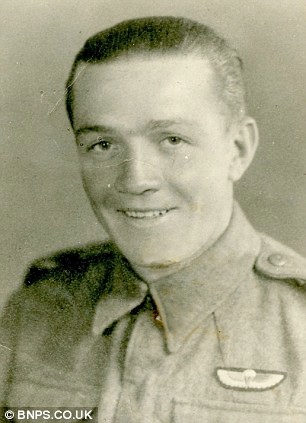
Major Charles 'Pat' Riley who led the daring 1942 raid which paved the way for the SAS
It was a daring SAS raid when just four men, led by a gallant major changed the course of World War Two by destroying desert fuel and petrol supplies.
And details of the mission were revealed this week as a bravery medal received by Major Charles 'Pat' Riley, who led the party, is set to make £60,000 at auction.
Major Riley, from Haltwhistle, Cumbria joined the Coldstream Guards in 1939.
He went on to become one of a quartet of elite soldiers who formed the L Detachment Special Air Service Brigade in North Africa in 1941.
The unit's remit was to operate behind enemy lines and sabotage and destroy German and Italian weapons, machinery, vehicles and supplies.
The first raid that he led on the harbour at Bouerat al-Hsun in Libya took out 18 vitally important petrol tanker lorries and four food dumps.
The operation caused major supply problems for the enemy, commanded by Field Marshal Erwin Rommel, and ultimately helped the British win their first battle of the war.
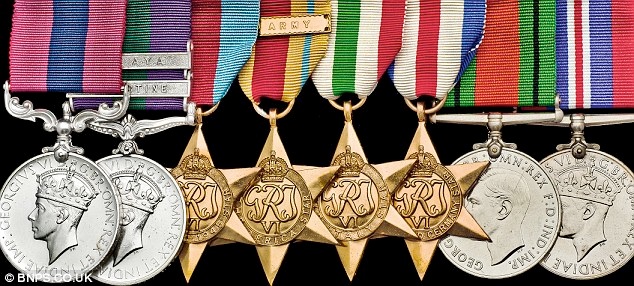
Major Riley's medals, which are expected to make £60,000 when they go to auction on Thursday
After taking control of North Africa, the Allies went on to launch the successful invasion of Italy from there.
Major Riley was awarded the Distinguished Conduct Medal (DCM) for the part he played in the 1942 raid. The medal is only bettered by the Victoria Cross in gallantry awards.
He and three comrades paved the way for formation of the SAS when they launched a surprise raid by going under the wire and infiltrating the enemy position with great success.
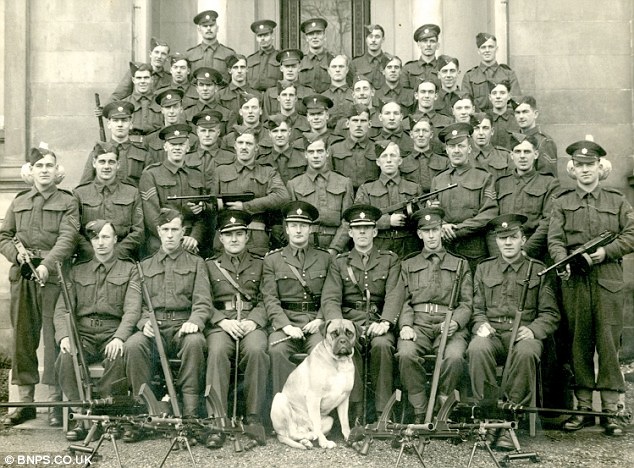
(seated far right) Sergeant Riley, in the Coldstream Guards where he began his career in the armed forces
The quartet became known as the Tobruk Four and were asked to join the SAS by legendary Colonel Sir David Stirling.
In January 1942 Col Stirling identified Bouerat Harbour as an important location to supply Rommel's forces and tasked the L Detachment with blowing up enemy ships, petrol dumps and tankers.
The raiding party consisted of 16 men split into two groups, with Maj Riley leading one of them.
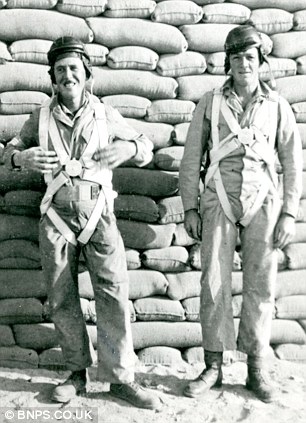
Major Riley (right) was awarded the Distinguished Conduct Medal for the part he played in the 1942 raid on the harbour at Bouerat al-Hsun in Libya where he took out 18 vitally important petrol tanker lorries and four food dumps
As they made their way to Bouerat, his men were spotted by an enemy plane and shot at, with rocks they were hiding behind being shattered into tiny pieces.
After being sighted the group were subjected to bombing and strafing by more planes for several hours but escaped unscathed.
Undaunted, Major Riley led his six men into Bouerat at just after midnight on January 23 and they had two hours to carry out the mission, setting the explosives for 2.30am.
Their biggest feat was attaching bombs to 18 large petrol carriers that were full with tens of thousands of gallons of fuel.
The DCM, along with Maj Riley's campaign medals, are now being sold for the first time and have been given a pre-sale estimate of £50,000 to £60,000.
Oliver Pepys, of Spinks of London auctioneers which will sell the medals tomorrow, said: 'The SAS today is synonymous with bravery and gallantry and the likes of Pat Riley personifies that traits.
'Pat Riley was one of the founder members of the SAS and his gallantry in North Africa set the tone for the conduct of the regiment today.
Major Riley left the army in 1945 and joined Cambridgeshire police but found it too sedate and volunteered as a Captain with the Malayan Regiment. He was based in the Far East until 1955.
After leaving the army again, he ran the Dolphin Hotel pub in Colchester, Essex, and then retired to Hastings, East Sussex in 1980.
His wife, Kaye, died in 1996 and he passed away in 1999 aged 84.
SAS IN THE DESERT: THE BRAVERY THAT HELPED TO SHAPE WORLD WAR II
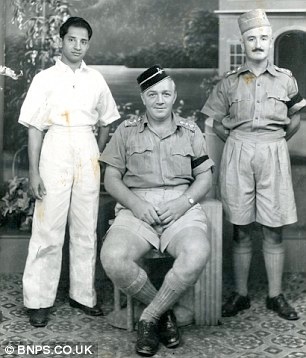
Captain Riley, in his role in the Malayan Regiment after World War Two
At 2.30am, while the raiding party made their escape, the desert sky lit up from the explosions.
As they sped off into the night in a truck they were ambushed by four Italian guards who peppered the vehicle with machine gun fire at point-blank range.
The truck driver ploughed through the bullets and mowed down the guards in the process.
Major Riley's recommendation for the DCM was published in the London Gazette in November 1942.
It read: 'By skilled and daring leadership he succeeded in bluffing the enemy sentries.
'Thereby he avoided giving any alarm which would have interfered with the work of other parties operating in the same area.
'He has shown the greatest gallantry and the highest qualities of leadership.'